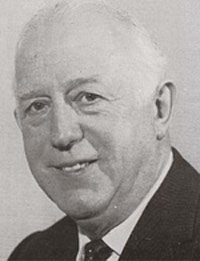The Beginning

On an Autumn evening in the year 1919, a group of colliery officials sat around a fireside in the bar of the newly opened ‘Officials Institute’ at Eastwood. They were all employees of Barber, Walker & Co., Ltd., the owners of the local Eastwood Collieries comprising of Moorgreen, Brinsley, Selston (Underwood), Watnall and High Park as well as Harworth in the north of the county and Bentley in Yorkshire. The conversation was free and easy and might easily have ranged from recollections of the four bitter years of the First World War just passed, to current difficulties at the local collieries.
One of the men present, Jim Campbell, introduced a new topic to the conversation; one which was to have far-reaching significance.
A week later Jim Campbell had arranged for a meeting of interested persons at the institute. This meeting was attended by over twenty enthusiastic men, resulting in the formation of the Eastwood Collieries’ Officials Male Voice Choir.
Cyril Clamp, a Deputy at Moorgreen Colliery, was appointed Conductor, with two more Deputies, Mr J W W Brown appointed Secretary and Mr F W Townsend appointed as Treasurer. The committee was composed of Messr’s:- W Wright, J Granger, M Lindley, L Cook, C Purdy, W Purdy, H Clifford, W Rowley and G Hardy and, possibly as a likely means of fundraising, no fewer than seventeen Vice-Presidents were appointed.
The Early Days
This newly formed choir had been born in an era when male voice singing was far more popular and widespread than it is today. There were already two firmly established male voice choirs in the immediate area – Eastwood & Greasley MVC and Pye Hill & District MVC – who were in a far better position to attract would-be choristers.
It is hardly surprising therefore that when in early 1920 the Eastwood Collieries’ Officials Male Voice Choir met for its first Friday evening practice night there were only nine singers present and progress was understandably slow.
By the middle of the first year things were taking a turn for the better. The choir had sought and obtained the whole hearted support of the owners of the Eastwood Collieries and senior officials of Barber, Walker & Co., Ltd., which was to be sustained for the next twenty seven years up to the Nationalisation of the Coal Industry.
Major T P Barber, the Chairman of the Company, became Patron and General Manager Mr C W Phillips accepted the post of President. The choir had also decided to drop the word ‘officials’ from its title to become known as the Eastwood Collieries’ Male Voice Choir and in doing so increased its membership to over forty voices.
By the end of the first year the choir had entered seven Music Festivals and gained first place at Codnor Park and Grantham. Music Festivals were a regular feature of social life at the time with scarcely a week passing without a town or even the smallest village organising its Annual Competition. The following year they participated in no fewer than ten competitions obtaining two further first places.
In its early days the choir appears to have devoted the majority of its attention to competitive work and it is interesting to note a change of direction in 1922 when it publicly advertised its availability for engagements as a ‘Concert Choir’. (If you’re interested, you can download a separate list of the choir’s past achievements at Music Festivals.)
In 1924, conductor Cyril Clamp left the Eastwood district and a replacement was found in the guise of Samuel Paling, a semi-professional conductor. It was during Samuel Palings time that, with an eye to the future, a number of teenage tenors were recruited to the ranks of the choir from the local collieries. One of these was 16 year old Granville H Mee, who joined the choir in 1925.
By 1928 Samuel Paling had been replaced by Thomas Musgrove who led the choir as Conductor until March 1936. During the period 1928 to 1936, Granville Mee had been further developing his outstanding musical talents, being appointed Organist and Choir Master at Brinsley Church. Also during this time, Granville had obtained the ‘Associate Diploma of the Trinity College of Music, London’. At the age of only 27, he added to his musical reputation when he took over the choir as its Conductor. Word soon got around the district of the attractions of singing with Eastwood under its brilliant young Conductor, with the choir rapidly growing its membership and its reputation.
Under Granville’s leadership the choir successfully extended its activities into the field of radio broadcasting. On Sunday 1st August 1937 the choir made its first broadcast with 41 voices singing six items, followed by three further broadcasts fairly quickly. The choir’s last broadcast before the War was an exchange broadcast with the Wellesweiler Choir from the Saar Region of Germany.
Six weeks later, a state of war existed between Great Britain and Germany.
Choir practice continued during the early months of the war but with the gradual loss of members to the armed forces it became clear that the choir could not carry on. Therefore, in September 1940, it was decided to suspend the activities of the choir. Fittingly the choir’s last public appearance was a concert given to servicemen of the Royal Air Force at Watnall Camp.
Back to Business
A few months after the end of the war in 1945, a letter was sent to the choir members inviting them to a meeting to discuss the resumption of choir activities. Some thirty members attended the meeting and even more turned up at the first practice a week later.
Under Granville Mee’s dynamic leadership the Eastwood Collieries Male Voice Choir was soon to be involved in a packed programme of concerts, radio broadcasts and music festivals. In 1946 the choir shared a radio broadcast with the Band of the Royal Army Ordnance Corps, followed by more broadcasts including ‘Bach’s St. John’s Passion’ to ‘Let the People Sing’ and ‘Friday Night is Music Night’.
In 1947 the coal industry was nationalised. Barber, Walker & Co., Ltd., in common with all other private Colliery Companies, ceased to exist and overnight the majority of choir members, including the conductor, became employees of the new National Coal Board (NCB). Fortunately the NCB, like its predecessors, were keen to promote and encourage the social and welfare side of the coal industry with the choir continuing to benefit from their support.
In 1948 the Eastwood Collieries’ Male Voice Choir had the honour of being selected to represent the East Midlands Division of the NCB in a combined concert of nine individual male voice choirs, eight colliery brass bands and three pipe bands in a concert at the Harringay Arena in London, under the baton of Sir Adrian Boult, performing to an audience of over 10,000 people. For the vast majority of the choir’s members it was their first visit to the capital and many were deeply fascinated by the London Underground!
The Golden Age
Throughout the 1950s the choir was to experience many highlights in radio broadcasting and at music festivals as well as performing up to fifteen concerts each year. The main emphasis seems to have been on competitive work. This continued into the 1960s and the choir were to experience the thrill of radio broadcasts and music festivals on some 27 occasions locally and further afield in the Midlands.
Stars of Television
During the busy period of the 1960s another landmark for the Eastwood Collieries’ Male Voice Choir occurred. This was the choir’s first television appearance. A telephone call from a producer at the BBC resulted in an exciting prospect for the choir, which they felt could not be ignored. On Wednesday 17th April 1963 a choir of over 50 voices arrived at Birmingham for the LIVE broadcast, which was to start at 10.15pm. The choristers nervously awaited their turn, which came at 10.55 pm. Right on cue, Granville Mee brought the Eastwood Collieries’ Male Voice Choir to life on television for all to see and hear.
The 1960’s were to end with a visit to England’s Premier Music Festival held at Blackpool resulting in a third place certificate for the Choir.Within ten days of the April 17th broadcast the BBC were at Eastwood Welfare to make another recording of the Choir for air in May. In June the Eastwood Collieries Male Voice Choir were again invited by the BBC to make a LIVE broadcast this time on ‘Friday Night is Music Night’.
The Seventies and Early Eighties
Moving into the 1970s and the choir still continued to have a busy programme of concerts, recitals and music festival competitions. 1972 saw an end to over 30 years association with the BBC after an agreement was reached by the BBC and the Musicians Union not to engage non-professional artistes for broadcast. Practice night had also been changed from Friday night to Tuesday night as the disco music in the room below the practice room was having an effect on practice sessions!
In the mid 1970s the choir gave serious consideration to two particular items: a choir uniform and a long playing record. Due to opposition from the members the subject of uniforms was quietly shelved for the time being.
1976 saw the production of the choir’s first recording, entitled Make Mine Music hotly followed in 1978 by a second recording called Fireside Favourites. In 1984 the choir released its third recording called In Harmony followed in 2000 with the choir’s fourth successful recording entitled Celebrating 80 Years of Song.
The end of an era was to occur in 1981 when the Eastwood Miners Welfare Institute, where the choir practised, closed its doors for the last time. The Welfare had been the choir’s home for 36 years. The National Coal Board came to the rescue with the offer of use of Eastwood Hall, which the choir gratefully accepted.
Christmas 1983 saw the choir again on the television, although not with the BBC, in a live broadcast of festive songs from the Council House Square in Nottingham.
1985 brought the closure of Moorgreen Colliery, the last of the Eastwood Collieries from which the Choir had taken its name. It was at this stage that the Committee briefly gave consideration to changing the name of the choir but the membership made it clear that they were proud of the roots from which they had sprung and wished to remain Eastwood Collieries’ Male Voice Choir.

1986 saw Granville H Mee reach his fiftieth year as Director of Music.
Sadly, however, in 1988 Granville died in hospital aged 79. Granville’s death was the end of a very long association with the Choir – 63 years a member with 52 of those years as its Conductor and Director of Music.
Into the Nineties
Whilst the choir, under Peter Brough’s leadership as conductor, kept up its busy and successful programme of engagements, the need to change homes for the choir surfaced again. In 1992 the choir left its base at Eastwood Hall and moved to the Age Concern Building on Edward Road, Eastwood. For the first time in the choir’s history it was obliged to pay rent to use practice facilities, something that had never needed to be paid when it was associated with Barber, Walker & Co., Ltd., and the NCB.
The New Millennium
Moving into the new millennium, the choir and its members continued to provide highly successful concert engagements, with the emphasis now on concert engagements rather than music festival competitions.
The choir has had the good fortune to perform in various prestigious venues, non more so than the Royal Albert Hall in London as part of a massed MVC in 2003, 2006 and 2009, under the baton of William Relton.
In 2008 the choir embarked upon their most ambitious venture to date hosting their largest concert ever, bringing together a massed male voice choir of over 300 voices, from 9 of the finest male voice choirs in the East Midlands, under the baton of our then musical director Gloria Preece. The choir was accompanied by the world famous, award-winning Grimethorpe Colliery Band at the Royal Concert Hall in Nottingham. A capacity audience of 2,000 were dazzled, thrilled and entertained by the band and choir and £15,000 was raised for the two major benefiting charities, Cancer Research UK & the British Heart Foundation. The concert helped cement the reputation and organising capabilities of this quality choir and became the launch pad for another Sounds Sensational concert in 2010, this time with Her Majesty’s Band of the Blues and Royals, which benefited the Royal British Legion and Cancer Research UK to the tune of £20,000.
The third in the Sounds Sensational series took place in November 2013. The musical guests were Her Majesty’s Band of the Royal Marines. Over £13,000 was raised for the Royal British Legion.
And so now the choir can now boast membership of over forty singing voices, and, as one of the oldest surviving colliery choirs in the UK, our future looks secure.
